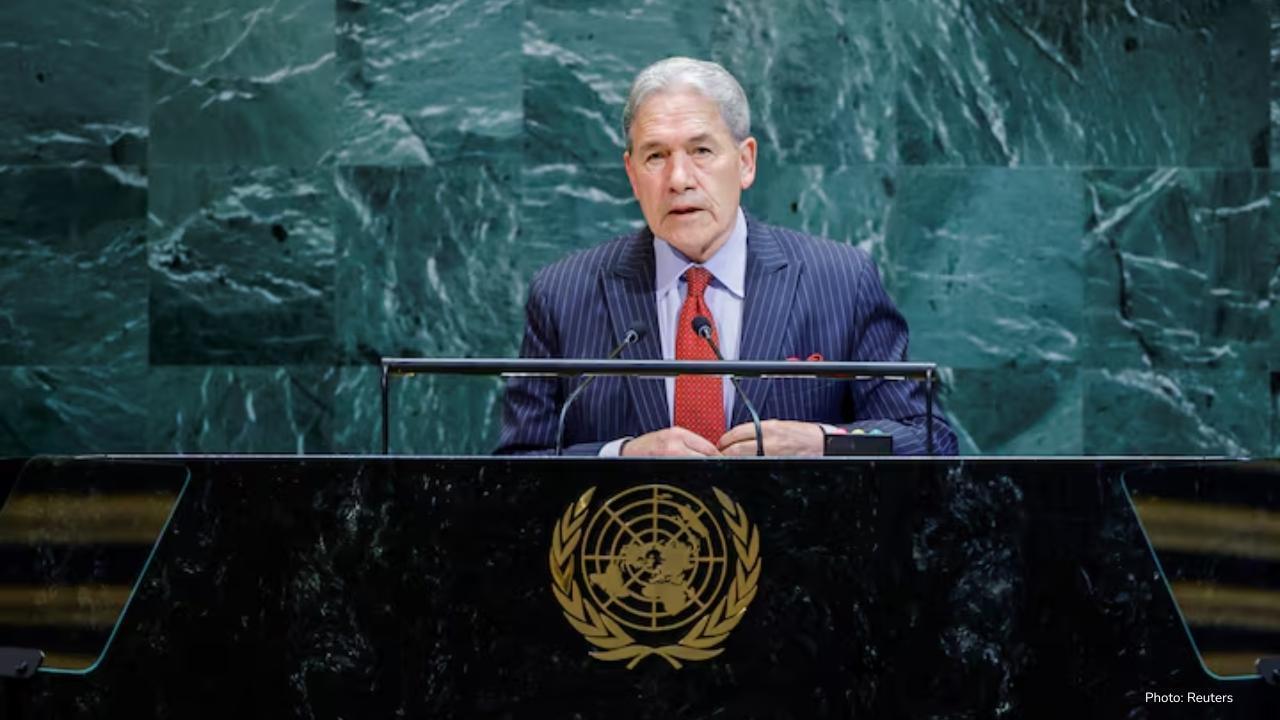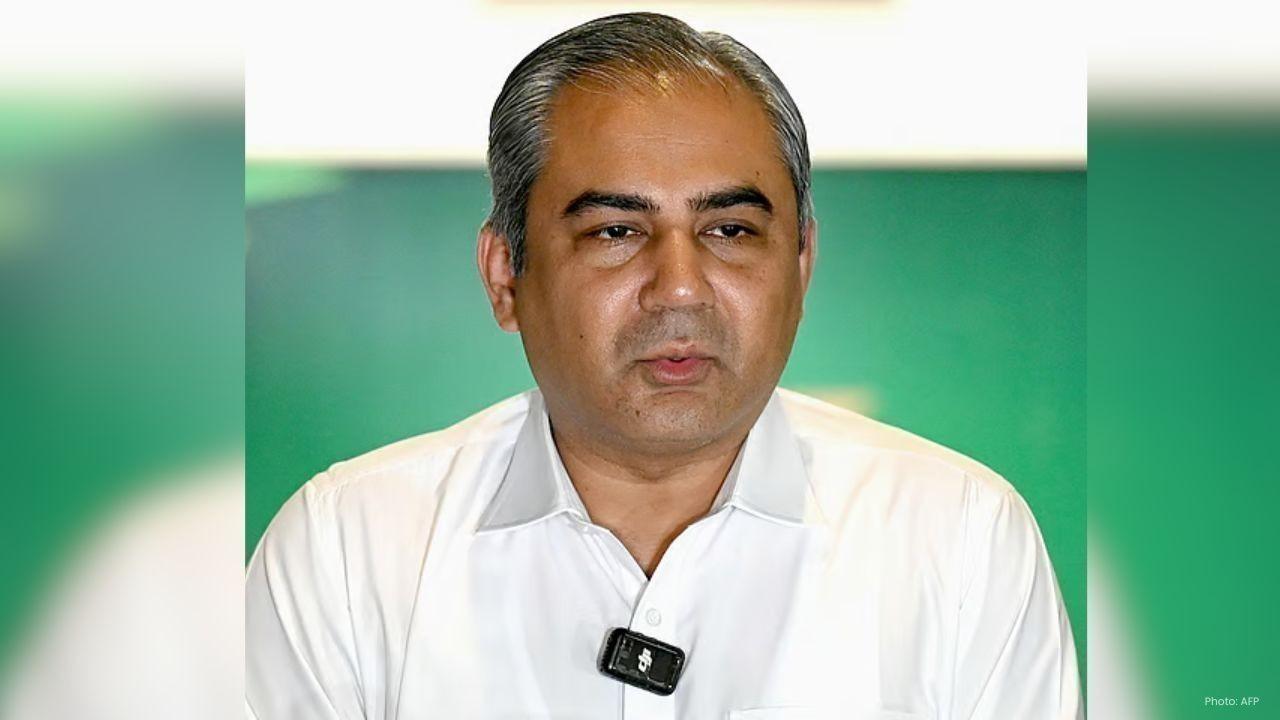
Post by : Monika
On September 27, 2025, New Zealand's Foreign Minister, Winston Peters, announced that the country would not recognize a Palestinian state at this time.
Speaking at the United Nations General Assembly in New York, Peters cited the ongoing war in Gaza, Hamas's continued control over the region, and the absence of clear plans for the future as reasons for this decision. He expressed concerns that premature recognition could complicate efforts to secure a ceasefire by hardening the positions of both Israel and Hamas.
Prime Minister Christopher Luxon echoed this sentiment, stating that the recognition of Palestinian statehood is a matter of "when, not if." He emphasized New Zealand's commitment to a two-state solution but indicated that the current circumstances were not conducive to such a move.
This decision places New Zealand at odds with several of its traditional allies, including Australia, Canada, and the United Kingdom, all of whom recently recognized Palestinian statehood. These nations align with over 140 other countries that support Palestinian aspirations for an independent homeland.
Background of the Issue
The question of Palestinian statehood has been a longstanding issue in international politics. The United Nations General Assembly granted Palestine non-member observer state status in 2012, but full recognition has been hindered by ongoing conflicts, territorial disputes, and political complexities.
Hamas, an Islamist militant group, has controlled the Gaza Strip since 2007, while the Palestinian Authority governs parts of the West Bank. Efforts to reconcile these two factions and establish a unified Palestinian government have been unsuccessful, complicating the path to statehood.
New Zealand's Position
New Zealand has historically supported Palestinian rights and has been an advocate for a two-state solution. However, the government believes that recognizing a Palestinian state under the current conditions could undermine peace efforts.
The ongoing conflict in Gaza, the lack of a unified Palestinian leadership, and the absence of clear plans for the future are seen as significant obstacles to meaningful progress.
By withholding recognition, New Zealand aims to encourage both Israel and Palestinian factions to engage in dialogue and negotiations. The government hopes that a more conducive environment for peace will emerge, allowing for a more effective and lasting resolution to the conflict.
International Reactions
The decision has elicited a range of responses from the international community. Countries that have recognized Palestinian statehood have expressed disappointment with New Zealand's stance, viewing it as a setback for Palestinian aspirations. Conversely, some nations agree with New Zealand's cautious approach, emphasizing the need for a stable and unified Palestinian leadership before granting full recognition.
The United Nations has reiterated its support for a two-state solution, urging both Israel and Palestine to resume negotiations. Secretary-General António Guterres called for an immediate ceasefire and emphasized the importance of addressing the underlying issues to achieve lasting peace.
Implications for New Zealand's Foreign Policy
New Zealand's decision reflects its broader foreign policy approach, which emphasizes a careful and principled stance on international issues. The government seeks to balance its support for Palestinian rights with the need for a stable and peaceful resolution to the conflict. By withholding recognition, New Zealand aims to maintain its credibility as an honest broker in international diplomacy and to encourage constructive dialogue between conflicting parties.
The move also underscores New Zealand's commitment to multilateralism and the rule of international law. The government believes that unilateral actions, such as premature recognition, can undermine the credibility of international institutions and hinder efforts to resolve complex issues.
Criticism from the Opposition
New Zealand's opposition Labour Party has criticized the government's decision, arguing that it represents a missed opportunity to support Palestinian aspirations for statehood. Labour's foreign affairs spokesperson, Peeni Henare, stated that the government's stance places New Zealand on the "wrong side of history" and undermines efforts toward a two-state resolution. He emphasized the importance of recognizing Palestinian statehood as a step toward achieving lasting peace in the region.
Looking Ahead
The situation remains fluid, and New Zealand's position may evolve as circumstances change. The government has indicated that it is open to revisiting its stance if conditions improve and a more conducive environment for peace emerges. In the meantime, New Zealand continues to advocate for a two-state solution and supports efforts to bring about a peaceful resolution to the Israeli-Palestinian conflict.
As the international community continues to grapple with the complexities of the Israeli-Palestinian conflict, New Zealand's cautious approach serves as a reminder of the challenges involved in achieving lasting peace. The government's decision underscores the importance of careful consideration and dialogue in addressing one of the most enduring conflicts in modern history.
New Zealand Palestinian state recognition Gaza conflict Israel-Palestine talks










Sinner & Swiatek Shine at China Open: Semifinal Spots Secured
Jannik Sinner and Iga Swiatek advance to the semifinals at the China Open. Read about their victori

Michigan church attack kills 4, injures 8 in shocking violence
A gunman drove into a Michigan church, fired shots, set fire, killing 4 and injuring 8 before police

Moldova’s Pro-EU Party Secures Majority in Key Vote
Moldova’s pro-European PAS wins a strong majority in the parliamentary election, weakening pro-Russi

Gabriel’s late header gives Arsenal 2-1 win at Newcastle
Arsenal snatch dramatic 2-1 win at Newcastle as Gabriel heads the winner in stoppage time; Merino eq

Air France Flight 447 Trial Opens 16 Years After Tragic Crash
Sixteen years after the Air France Flight 447 crash, a trial opens against Air France and Airbus. Le

Europe close to Ryder Cup win after strong weekend play
Team Europe is on the verge of winning the Ryder Cup, showing great form in Italy and needing only a